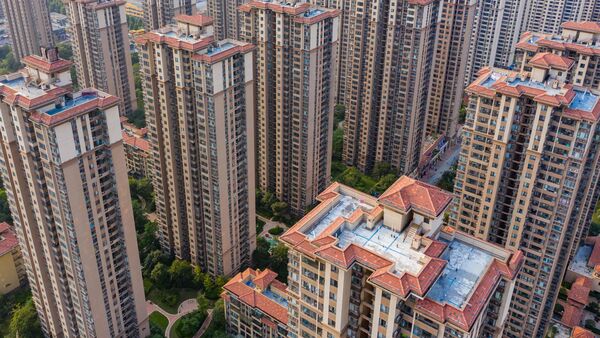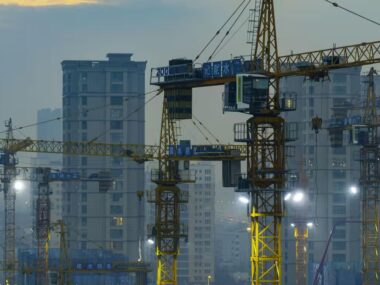China’s economic growth is predicted to reach its 5% goal for this year despite the lingering real estate crisis. The largest problem for the country, according to analysts, is property, and pressure on the real estate market is projected to only increase.
According to the most recent Bloomberg survey, China will just about achieve its 5% economic growth goal for this year, but the continuous real estate crisis is increasing the likelihood that it won’t.
According to the consensus prediction in a recent Bloomberg survey of 78 economists, the economy will grow by 5% in 2023, down 10 basis points from a previous study. Analysts cite property as the country’s biggest difficulty.
Despite recent efforts by the government to boost property, analysts at Hong Kong-based investment firm Poseidon Partner predicted that “the real estate sector will continue to be under mounting pressure.” “We anticipate that players who have accrued debt in the past will continue to struggle,”
The analyst survey comes at the same time as fresh data from Bloomberg Economics that indicates the “around 5%” growth target is still doable but not certain. They put the likelihood of undershooting at 18%.
“The drag from the property slump, fragile sentiment, and widespread debt stress in the corporate sector could well knock the economy onto a lower trajectory,” economists Chang Shu and Andrej Sokol said in the research released on Tuesday. This year’s projected gross domestic product growth is 5.4%.
This year’s growth is already expected to be around 5%, according to HSBC Holdings Plc, Morgan Stanley, and Citigroup Inc., with HSBC this week lowering its prediction from 5.3% to 4.9%.
With the decline in exports slowing and official surveys of factory activity creeping closer to the line over which indicates expansion, data from August suggested some of the economic headwinds may be bottoming out. Additionally, credit expanded faster than anticipated, which may point to some stability in household demand for mortgages as policymakers attempt to support the housing market.
According to Bloomberg Economics, the upward surprise from those numbers has reduced the likelihood that China would miss its official growth target from 32% in July to less than a fifth in August. However, uncertainty still exists, particularly with regard to the housing market. According to data on home sales, a housing rise in the main cities in the country has already slowed down.
Arjen van Dijkhuizen, senior economist at ABN Amro, stated that “targeted support has yet to filter through more convincingly into the property market data.”
According to a different survey, China’s top problem is unquestionably the real estate crisis. The top concern, according to 17 of the 21 economists surveyed by Bloomberg, was “real estate”. Three respondents brought up the economy’s decline, while the final responder highlighted the nation’s low level of confidence.
When asked about the ongoing housing market recession, 15 of the 21 economists surveyed responded that they believe home purchases will remain in decline at least through the start of next year.
Former central bank adviser Li Daokui warned that it may take up to a year for the real estate market to revive and urged Beijing to step up efforts to stimulate lending to developers in order to stop the spread of defaults. Li recently told Bloomberg News that while sales in major cities would resume rise sooner, smaller cities might not see “good recovery” for up to a year.
HSBC analysts, including Jing Liu, explained their downgrade in a research report this week. “The drag from property has yet to fully abate, while external weakness will continue for some time,” they said.
“Policymakers are restraining from unleashing a ‘sugar rush’ of policy support,” they continued, “to avoid exacerbating structural imbalances.” Despite this, financial and monetary support efforts are still being carried out; however, a longer period of time will probably be needed for them to be more effective.
Added outcomes from the Bloomberg poll include:
- The third quarter of 2023 is predicted to see China’s GDP grow by 4.3% y/y, and the fourth quarter is predicted to grow by 4.8% y/y, both slightly slower than the previous poll.
- Forecasted growth in 2024 is stable at a 4.5% year-over-year increase.
- Still, economists anticipate a 10 basis point reduction in China’s one- and five-year loan prime rates this year.
- The forecast for reductions in the one-year medium-term loan facility rate of the central bank of 10 basis points before the end of the year remained constant.
- Producer prices are anticipated to decrease 2.9% for the entire year, which represents a minor improvement from the last survey’s projection of a 3% decline.
- In 2023, exports are anticipated to decline by 4.2%, as opposed to the previous poll’s prediction of a 3% decline.
- This year, imports are expected to decline by 5.6%, maintaining the prior prediction.











